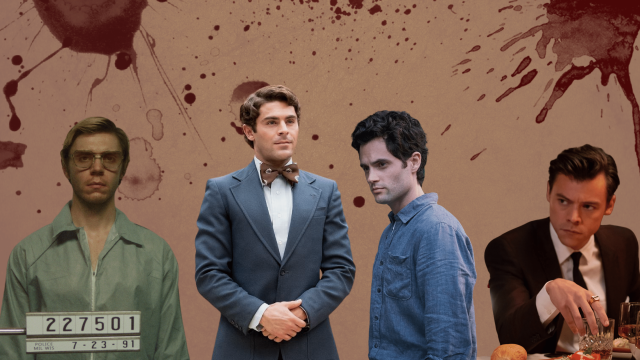
“Don’t Worry Darling” was one of the most highly-anticipated movies of 2022, whether it be because of the drama surrounding the movie’s production or the casting of one of the most famous pop stars of this generation: Harry Styles. While the movie attempted to fall within the “good for her” subgenre, its failure to follow through on critical themes prevented it from having a major feminist impact. But, another major factor that minimized director Olivia Wilde’s problematic feminist message was the audience’s reaction to Harry Styles as the movie’s male lead, Jack Chambers.
It is unsurprising that an audience would fantasize about having Harry Styles as their husband. Styles is charming and charismatic, and Jack seems to share those attributes with Styles in the first half of the film. Jack attempts to keep Alice Chambers (Florence Pugh) in a virtual cult known as the Victory Project. Alice, his real-life girlfriend and Victory Project wife, foils Jack’s plan once her memory is restored after he sends her to electroshock therapy for starting to put pieces of his monstrous, secret arrangement together. Jack, a borderline incel in real life, presents a glorified version of himself in the Victory Project to conceal his evildoings and convince Alice to stay with him and “be perfect” together. What is surprising is that after the “real” Jack is revealed, the audience still idealized him despite continuing to be an antagonist to Alice.
This is not the first instance that a male antagonist has been romanticized because the actor who plays that character is attractive. One of the most prominent examples of this is Penn Badgley’s character Joe Goldberg in the show “You” (2018-present). While Joe is set up to be a character that audiences can sympathize with, his narcissistic, psychopathic and homicidal tendencies should make an audience feel disgust or contempt for him. Instead, Badgley finds himself debating with the show’s viewers about how because Joe is a murderer, he should not be romanticized. Badgley replied to a tweet that said “the amount of people romanticizing @PennBadgley’s character in YOU scares me,” with “Ditto.”
A more recent example of this trend is Evan Peters playing Jeffrey Dahmer in “Monster: The Jeffrey Dahmer Story.” While Peters hasn’t intentionally romanticized Dahmer in this show, his attractiveness has overshadowed his performance as a serial killer for some viewers. It’s as if conventionally attractive male actors cannot escape being sexualized, which is also a serious issue associated with the romanticization problem. Despite the intentions of actors and producers, they usually fail to prevent, or even just minimize, the romanticization of a character, especially one based on a non-fictional serial killer. Peters is simply — and unintentionally — joining a long list of actors being romanticized for playing inherently bad men.
This is not a new trend, as many conventionally attractive actors have been cast as serial killers in biopics. Some well-known examples include Zac Efron as Ted Bundy in “Extremely Wicked, Shockingly Evil and Vile” (2019), Darren Criss as Andrew Cunanan in “The Assassination of Gianni Versace” (2018) and Ross Lynch who’s also Jeffrey Dahmer in “My Friend Dahmer” (2017).
Casting attractive men to play evil characters encourages audiences to view these men as handsome and worthy of sympathy, even going as far as to make them into heroes and sex symbols. The “evil is sexy” trope is especially highlighted in entertainment pieces like these. This trope emphasizes power dynamics between characters, as an antagonist can take advantage of someone’s lust for them in exchange for power. These characters also tend to have looser sexual morals, sexualizing them further. Overall, they are not afraid to use their attractiveness to seduce and deceive the hero and continue carrying out their evil actions.
Is this an issue that we can pin the blame on a specific person or group for how a character is perceived by audience members? Is it the fault of casting directors for hiring attractive men to play inherently bad people? The purposeful casting of these attractive men could be a money grab by Hollywood movie and television show makers who want to gain views with a handsome male performing as a creepy male lead. Another aspect to consider is whether or not responsibility falls on the audience to be able to separate a character from the actor playing them. Badgley proposes that iconic male characters in film are naturally predatory, giving reason for why an audience might also like characters like Joe Goldberg and Jack Chambers. The example that Badgley refers to is Christian Bale portraying Patrick Bateman, a serial killer with a slew of mental problems, in the film “American Psycho” (2000). This trend of attractive men playing predatory and evil characters is not new to those working in Hollywood or to viewers.
Knowingly and willingly romanticizing an evil male character is not only inappropriate, but it discredits the actors who play said characters. Even though Harry Styles is new to the acting scene and may not have put on an Oscar-worthy performance, he did an impressive job playing Jack in “Don’t Worry Darling.” Jack has a very different personality than Styles, who is known for promoting kindness and love in his music. Many audience members (most of whom are fans of Styles) did not separate Styles as an actor from his immoral character, Jack.
One TikTok user stated, “I’d kinda rather live in the Victory Project when all I had to do was clean this window every day and make dinner for Harry Styles.” It is harmful to see young women ignoring the many red flags that Jack put up and instead focusing on how they would do anything for Jack because of his attractiveness.
It is also especially important to note that this film could be categorized under the “good for her” subgenre, where there is a focus on a woman’s ability to escape from the men in her life who control or manipulate her. It is alarming to see many of Styles’ female fans expressing their anti-feminist takes on a movie that intended to heroicize the “happy housewife,” Alice. Styles’ open support of feminist movements further juxtaposes his fans’ blind admiration of Jack. Alternatively, viewers focused on romanticizing the man who caused Alice an absurd amount of abuse and trauma.
Creating shows or films about serial killers and their crimes already romanticizes these horrific men on their own. Audiences do not need to add onto the romanticization of serial killers and other antagonistic male characters by putting precedence on their attractiveness rather than their despicable personalities.
There is blame that falls on behalf of movie and television studios and producers, as well as the audience, for continuing to popularize and romanticize these antagonistic male characters. It seems that the romanticization of attractive male characters who are inherently bad people will continue to be an issue as long as attractive actors are casted to play them, and as long as these types of entertainment pieces continue to bring in a profit for studios.













